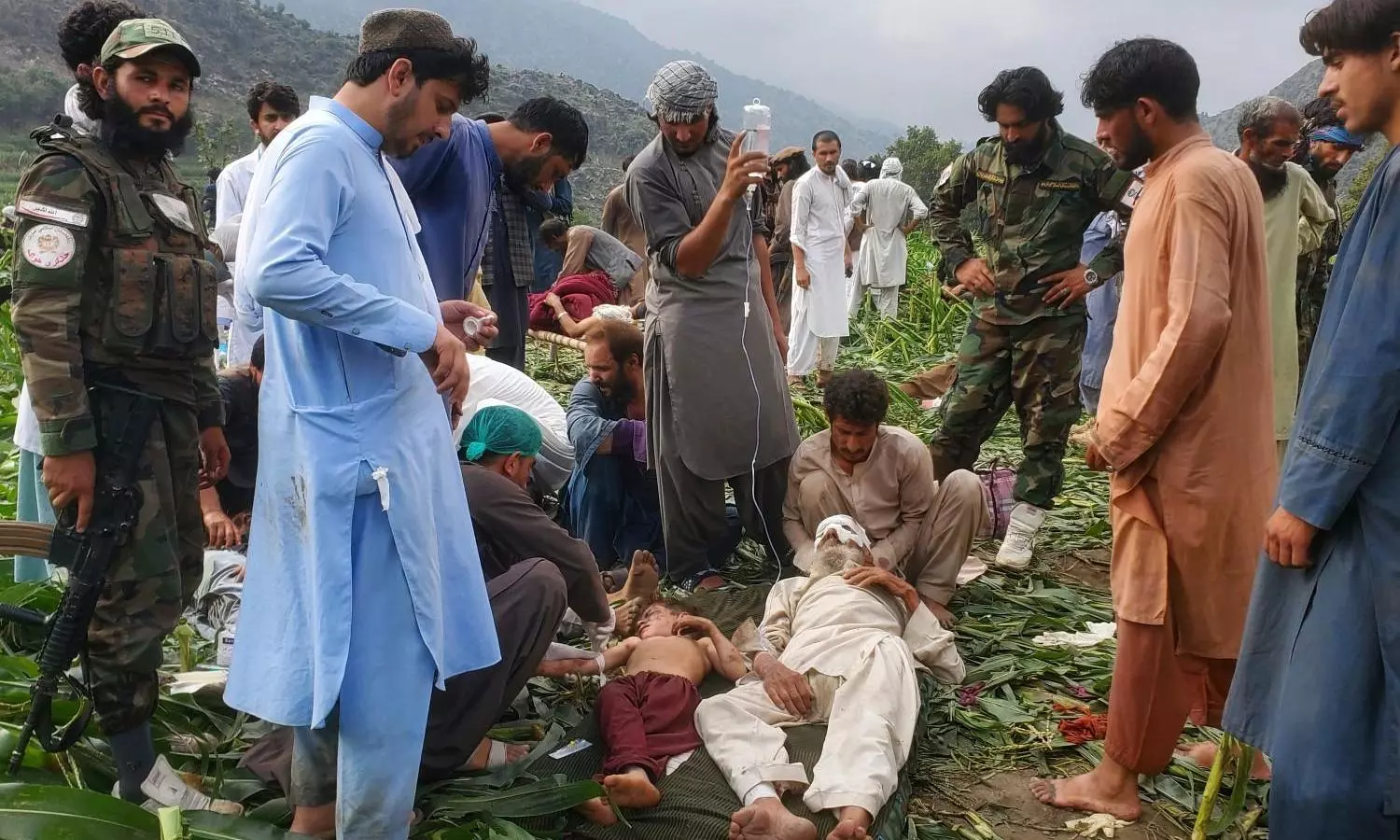
The absence of female rescue workers, itself a result of Taliban prohibitions on women’s medical education and public employment, makes this rule particularly devastating. Photo: AP/PTI
Taliban's regressive gender rules hinder Afghanistan quake rescue operations
Women have often been the last to be rescued, or not rescued at all, because of the Taliban's 'no skin contact with unrelated males' rule that forbids males from touching them

Centuries-old customs combined with Taliban-enforced gender restrictions have deepened the tragedy for Afghan women after the recent deadly earthquake which killed at least 2,200 people and reduced entire communities to rubble.
Because of the Taliban’s ban on "skin contact with unrelated males", women have often been the last to be rescued or not rescued at all. The rule forbids male rescuers from touching them, even in emergencies.
Also Read: 2 powerful aftershocks rock Afghanistan as quake death toll hits 2,205
Gender rules complicate rescue
Strict cultural and religious codes permit only a woman’s close male relatives - her father, brother, husband, or son - to physically assist her. Similarly, women are prohibited from touching men outside their family.
The absence of female rescue workers, itself a result of Taliban prohibitions on women’s medical education and public employment, makes this rule particularly devastating.
In many cases, women trapped beneath debris have been left behind while the dead were removed, showing how gender rules, not just collapsed structures, are obstructing rescue efforts in Taliban-controlled Afghanistan.
Afghanistan, still reeling from Sunday’s quake, has also endured aftershocks. On September 4, one with a magnitude of 5.6 struck again.
Women left helpless
"They gathered us in one corner and forgot about us," recalled Bibi Aysha, quoted in a New York Times report, describing how rescue teams arrived more than 36 hours after her village in the mountainous Kunar Province was destroyed.
Despite bleeding and injuries, she and other women and girls were ignored, no one checked on them or offered help.
Tahzeebullah Muhazeb, a 33-year-old volunteer in Mazar Dara, painted a similar picture. Women trapped under rubble waited as male rescue workers hesitated, fearing the consequences of touching unrelated women. In some cases, female victims remained buried until women from neighbouring areas arrived to assist.
"It felt like women were invisible," Muhazeb said, adding that men and children were prioritised while women were left to one side, waiting for care. If no male relative was present, even the dead were dragged out by their clothes to avoid physical contact.
Also Read: Why was the Afghanistan earthquake so deadly? A disaster resilience expert explains
Female healthcare workers shortage
The magnitude-6 quake killed over 2,200 people and injured 3,600, flattening villages and laying bare the entrenched gender discrimination women face under Taliban rule.
"Women and girls will again bear the brunt of this disaster," warned Susan Ferguson, UN Women’s representative in Afghanistan. "Their needs must be at the heart of the response and recovery," she said.
While the Taliban have not issued gender-specific casualty figures, survivors, doctors, and aid workers confirm that women are disproportionately affected. Many remain trapped or untreated, as male rescuers are barred from physically assisting them.
The shortage of female healthcare workers has compounded the crisis. Following the Taliban’s 2023 ban on women entering medical education, female doctors and nurses are now rare, particularly in rural, quake-hit areas. Some hospitals visited by New York Times journalists reportedly had no female staff at all.
Also Read: Over 800 dead as strong earthquake rocks eastern Afghanistan near Pak border
Taliban's regressive rule
Sharafat Zaman, spokesperson for the Taliban’s Ministry of Health, admitted there was a lack of female workers but insisted women were still serving in hospitals across Kunar, Nangarhar, and Laghman provinces.
Afghanistan remains among the world’s most repressive countries for women under Taliban rule, now in its fourth year.
Despite international pressure from Muslim nations, human rights groups, and institutions like the World Bank, the Taliban have shown no intention of easing their strict gender policies, which experts warn are damaging social cohesion and economic prospects.
Girls are barred from schooling beyond the sixth grade, women need a male guardian to travel even short distances, and jobs are increasingly off-limits.
Women are banned from most sectors, including humanitarian work. Even Afghan women employed by UN agencies face harassment so severe that some agencies have instructed them to work from home for their safety.

